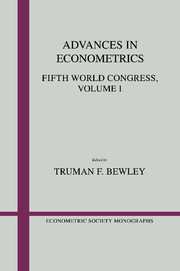Book contents
- Frontmatter
- 1 Specification testing in dynamic models
- 2 Specification tests: an overview
- 3 Kernel estimators of regression functions
- 4 Identification and consistency in semi-nonparametric regression
- 5 On econometric models with rational expectations
- 6 Calculating asset prices in three example economies
- 7 The Kalman filter: applications to forecasting and rational-expectations models
- 8 Applications of the Kalman filter in econometrics
2 - Specification tests: an overview
Published online by Cambridge University Press: 05 January 2013
- Frontmatter
- 1 Specification testing in dynamic models
- 2 Specification tests: an overview
- 3 Kernel estimators of regression functions
- 4 Identification and consistency in semi-nonparametric regression
- 5 On econometric models with rational expectations
- 6 Calculating asset prices in three example economies
- 7 The Kalman filter: applications to forecasting and rational-expectations models
- 8 Applications of the Kalman filter in econometrics
Summary
Abstract: This chapter is concerned with methodological aspects on specification tests, with particular emphasis on general methods for deriving the asymptotic properties of specification test statistics in the presence of nuisance parameters in the context of nonlinear models. The properties of the classical procedures are briefly recalled. A general derivation of Hausman’s specification test is given. The problem of simultaneous misspecification tests is discussed. Finally, the properties of some test statistics are examined when the model is misspecified.
Introduction
The purpose of this chapter is to present certain aspects of the theory of specification tests. At the outset, we would like to emphasize that we do not intend to cover the subject completely and the choice of material reflects to some extent our own limitations and to a great extent our own interests. In particular, we shall only consider theoretical aspects of the subject, and this may be viewed as a shortcoming of this survey.
A good part of the material contained here is already covered in other surveys [see, e.g., Engle (1984), Ruud (1984), and the comments on this chapter by Breusch and Mizon (1984), Hausman (1984), Lee (1984), and White (1984)]. In our presentation of the subject we would like to emphasize the following points:
Most of the problems of specification tests arise in the context of nonlinear models. Therefore, it is extremely useful to develop general testing procedures that are valid for large classes of nonlinear models.
The tests criteria and their statistical properties depend directly on the estimation procedure from which they are derived. In this respect, there is no possible separation between estimation theory and hypothesis testing theory for nonlinear econometric models.
In almost all testing problems considered in econometrics, null hypotheses are composite, that is, do not specify the model completely. The most common testing problems are about testing in the presence of nuisance parameters. One should explicitly incorporate the treatment of these nuisance parameters in deriving test statistics in order to assess their properties when nuisance parameters are eliminated in an appropriate way.
When deriving a new test statistic, one should try to compare it with existing ones for the same problem. There are, at least, two ways of comparing tests statistics:
(a) One can often show that the test criteria may be derived from the same set of estimating equations for a given estimation framework.
(b) One can often compare the statistical properties of test statistics to be used for the same testing problems. In the context of nonlinear econometric models, two methods of comparison seem to be particularly useful, namely the computation of the asymptotic local power and Bahadur’s approximate slope of tests statistics.
- Type
- Chapter
- Information
- Advances in EconometricsFifth World Congress, pp. 59 - 98Publisher: Cambridge University PressPrint publication year: 1987
- 4
- Cited by



